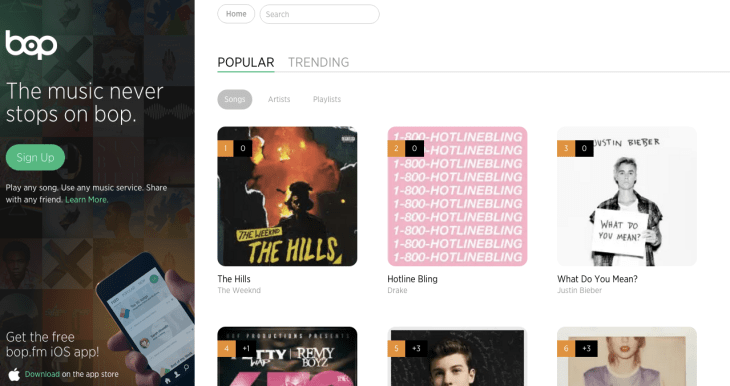Bop.fm — a Y Combinator startup that had built a platform to share links for music tracks across a number of different walled-garden streaming services — has been acquired. But it’s not a buyer from the music industry: it’s LifeLock, the identity theft protection company.
Bop.fm — whose motto had been “The music never stops on Bop.fm” — says it plans to shut down its website, mobile app and embedded links on October 31. It’s giving users the option of exporting their playlists to use elsewhere.
It’s not clear what the logic is for LifeLock in buying Bop.fm. We’ve reached out to Bop and received a firm “no comment” beyond what is written in the blog post:
“Our team will apply our consumer product DNA to help enhance the services that LifeLock delivers to millions of customers – we can’t wait to show you what we have in store.” We’re now also contacting LifeLock.
LifeLock, which went public in 2013, focuses on providing protection for consumer data in cases of identity theft. More recently, the company has come under fire from regulators, consumers and industry groups for misrepresenting what it actually does. Just yesterday, LifeLock issued an update saying that it had reached a settlement with the FTC and class action groups over these claims, as a step to avoiding litigation.
The Bop.fm acquisition could just be a straight soft-landing acquihire for engineering talent for weaving together identity across disparate services. On a more ambitious note, it could point to LifeLock exploring how it might shift into other areas of identity management, possibly covering different verticals. (The company has recently been posting on Internet of Things services, so it’s not too outlandish to think they may be exploring something beyond their current, maligned business.)
In any case, LifeLock is a far step away from the business of Bop.fm, which was founded in 2013 by Shehzad Daredia and Stefan Gomez. The startup had raised $2 million from Y Combinator (where it was incubated in the summer of 2013), Charles River Ventures, Fenox Capital and FundersClub.
With the founders previously working on solving search problems at places like Kayak and Billshrink (sold to MasterCard), Bop.fm was originally built as a web-based service to fill a sharing gap in the music streaming market: People post links on social networks with songs they are listening to, but there is no guarantee that everyone who sees that link will be a subscriber to the same service, or there may be geofences that prevent users from accessing a link to a specific site.
Bop.fm’s approach to this was to build a backend that brought together APIs for several different services like Spotify, Rdio and iTunes. Consumers could share a single link, and Bop.fm would then match that link up with whatever service you — the viewer of that link — had subscribed to. You would then automatically get redirected there to hear the track, given the option to add it to a playlist, and so on. And in cases where the user may not subscribe to any streaming service, a YouTube link would be offered.
There were some affiliate opportunities, too: Bop.fm could serve users a free link with a promotion to subscribe to a service, for example. (In cases where you were connected to more than one service, Daredia once told me that there was an intelligent engine that would sniff out what you used more frequently and open that up first, but you could imagine how that, too, could have been monetized, a la Google’s ad-based search results appearing at the top of the pile.)
Bop.fm had some decent traction both from consumers and the wider music and tech industry: the company says 9 million users have shared links on its platform. It was using APIs from some 15 different music services to give users as many options as possible for hearing a track. And in addition to Spotify, Rdio and iTunes, other partners included Beats Music, Deezer, YouTube and SoundCloud.
On top of that, publications like Huffington Post (like us, owned by Verizon/AOL), Complex, Spin and others were embedding Bop.fm links into their posts and artists like Snoop Dogg, Lil Wayne and Ariana Grande were sharing Bop.fm links, which also raised the company’s profile.
And over time it expanded into other areas like mobile, where a lot of streamed music is consumed today.
But all this was not enough.
“We realized we had a long way to go to unify the ever-evolving digital music landscape,” the founders write in a blog post. “Building out a central destination for consumers can be very expensive and require hundreds of millions of dollars in funding, in an industry fraught with monetization concerns.”
Indeed, while Spotify has raised around $1 billion to build out its business, which is now valued at upwards of $8 billion, there are still question marks around the company’s margins and profitability. A competitor to Spotify, Deezer, this week postponed its IPO indefinitely citing market conditions and the poor economic performance of yet another streaming company, Pandora.
